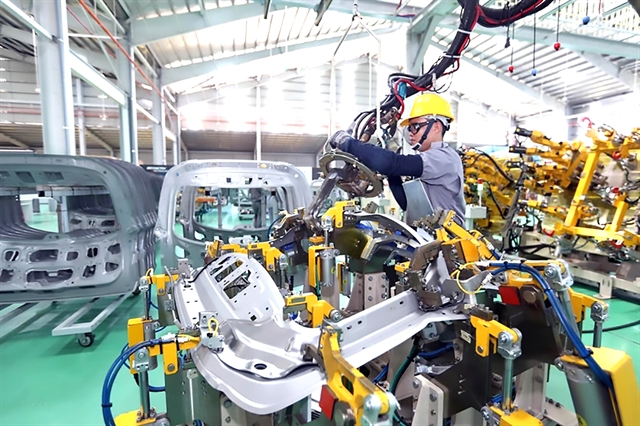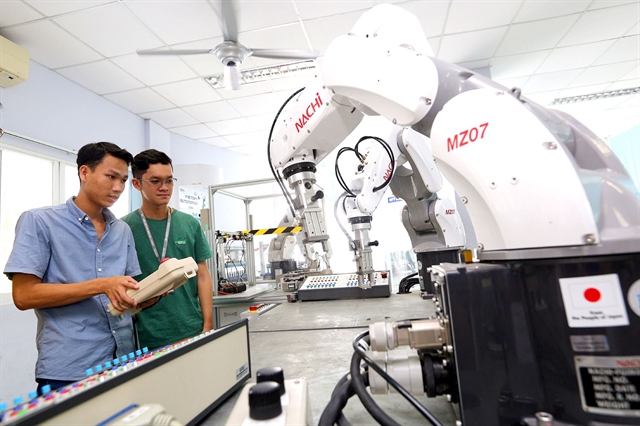 Opinion
Opinion

 |
| THACO's auto parts production line at Chu Lai Open Economic Zone, Quảng Nam Province. — VNA/VNS Photo |
HÀ NỘI — Creativity and innovation in Việt Nam has reached significant milestones in recent years, with ongoing improvements in national and local innovation indices thanks to the efforts of scientists, businesses and supportive policies.
According to the Ministry of Science and Technology (MoST), the 2023 Global Innovation Index (GII) report highlights Việt Nam's consistent improvement in innovation rankings over the past 13 years.
In 2023, Việt Nam ranked 46th out of 132 countries and economies, up two places from 2022, and fourth in Southeast Asia.
The country's innovation inputs, which include institutions, human capital and research, infrastructure, market sophistication and business sophistication, rose from 59th to 57th.
Việt Nam's ranking for innovation outputs, including knowledge and technology outputs and creative outputs, also improved from 41st to 40th.
Việt Nam is among seven middle-income countries that have shown the most significant progress in innovation over the past decade.
To further promote innovation at the local level, MoST has developed a Provincial Innovation Index (PII), implemented nationwide since 2023.
On March 12, the ministry announced the first results of the PII. This index provides a valuable resource, offering scientific and practical bases for agencies, organisations, individuals, and local leaders to create and implement policies for socio-economic development based on science, technology and innovation.
The establishment of innovation centres has also significantly boosted startup activities, fostering a new generation of businesses grounded in intellectual property and capable of competing in global markets.
THACO INDUSTRIES under THACO Group exemplifies the successful integration of technology and innovation.
With over US$850 million invested, the company has a research and development centre, a mechanical complex, and component manufacturing plants.
THACO INDUSTRIES's general director Đỗ Minh Tâm said that the automation of production processes using robots and AI has met international standards.
By late 2022, THACO INDUSTRIES had established a 20,000 square metre R&D centre, investing over $20 million and attracting more than 1,000 experts and engineers. This centre focuses on design, testing, prototype manufacturing and product trials, catering to specific customer needs and providing industrial solutions.
General Director of THACO Group Phạm Văn Tài emphasises the importance of technology and innovation for enhancing product quality and competitiveness.
Supported by MoST, THACO has contributed to over 200 innovations and 2,000 practical improvements, boosting production efficiency and economic value.
THACO is now a strategic partner for global automotive brands like Kia, Mazda, Peugeot, Toyota, and Hyundai, with exports to 15 countries, including North America, the EU, Australia and ASEAN, showcasing Việt Nam's growing role in the global supply chain.
Similarly, Rạng Đông Light Source and Vacuum Flask Joint Stock Company, led by General Director Nguyễn Đoàn Thăng, has focused on science, technology and innovation for over 60 years. Rạng Đông's strategy includes digital transformation, supported by four R&D centres.
Certified with ISO standards, Rạng Đông's LED products have been recognised as high-efficiency products by the Ministry of Industry and Trade for four consecutive years.
Thăng asserted that ongoing success depends on continued application of science and innovation, aiming for leadership in digital transformation, green energy and sustainable development.
The growth of THACO and Rạng Đông shows the effective integration of technology and innovation by Vietnamese enterprises, demonstrating the country's commitment to global innovation and competitiveness in an evolving landscape.
In recent years, innovation has gained increasing importance, significantly boosting productivity, efficiency, growth and national competitiveness. It serves as a vital link between scientific research, technological development and socio-economic progress.
However, inconsistent terminology surrounding innovation and creative entrepreneurship has led to confusion and inefficiencies in policy implementation.
 |
| Trainees practice programming and operating robots at the training centre in HCM City Hi-Tech Park. |
Nguyễn Đức Hoàng, Deputy Director of the Department of Technology Development and Innovation, pointed out that Việt Nam's legal and administrative documents use over 30 different terms for organisations related to innovation and creative entrepreneurship, resulting in inconsistencies and confusion. Each term corresponds to different policies and criteria, leading to mismatches between organisational functions and activities.
To tackle this issue, Hoàng proposed clarifying organisational types and definitions to formulate effective policies that support innovation and the startup ecosystem. This approach involves strengthening the legal framework, bolstering intellectual property protection, and devising a comprehensive national skills strategy. He underscored the importance of fostering collaboration in R&D among research institutes, universities and businesses.
He distinguished between innovation, which translates knowledge and technology into tangible products, and creative entrepreneurship, which focuses on securing capital and developing new business models and products. While innovative enterprises prioritise technological advancements, creative startups often pursue rapid growth through high-risk investments and external funding.
In contrast, small and medium-sized enterprises (SMEs) have moved beyond the startup phase and operate with established business models and customer bases. Despite some overlap, SMEs and creative startups differ significantly in development stages, risk tolerance, funding sources and business strategies, necessitating tailored legal frameworks and support mechanisms. The current confusion between creative startups and SMEs in existing laws leads to inappropriate policies and support.
Deputy minister of Science and Technology Hoàng Minh said that a supportive legal framework is crucial for innovation and creative entrepreneurship. Without clear regulations, there is confusion between creative startups and SMEs, highlighting the need for precise definitions and specific regulations.
Phạm Hồng Quất, Director of the Department of Market Development and Science and Technology Enterprises, noted the robust growth of Việt Nam's startup ecosystem, with $427 million in venture capital invested by March 2023.
Hà Nội and HCM City now rank among the top 200 global startup ecosystems.
Việt Nam has approximately 1,400 organisations supporting startups, with a significant concentration in these two cities.
Việt Nam has produced four tech unicorns: VNG, VNLIFE, MOMO, and SKY MAVIS.
To further nurture creative startups and propel Vietnamese enterprises to global success, specific policies for innovation and creative entrepreneurship are essential, enabling Vietnamese companies to aspire toward future unicorn status, Quất said.
According to Minister of Science and Technology Huỳnh Thành Đạt, science, technology and innovation are crucial foundations for Việt Nam's rapid and sustainable development. Đạt emphasised the need for a robust legal framework to support these sectors.
The 2013 Law on Science and Technology has laid a strong foundation but requires updating to address current challenges and opportunities.
Proposed amendments focus on enhancing investment and financial mechanisms to support science, technology and innovation.
Deputy Minister Bùi Thế Duy highlighted the importance of prioritising enterprises as key drivers of innovation, alongside research institutions.
The updated law aims to create an environment conducive to fostering innovative startups and leveraging technology for rapid growth, both domestically and internationally.
Attention is also directed towards improving policies for human resources, infrastructure and knowledge dissemination to bolster the potential for technological innovation.
Ultimately, the goal is to position these sectors as strategic pillars for driving productivity, quality and economic competitiveness in Việt Nam. — VNS




